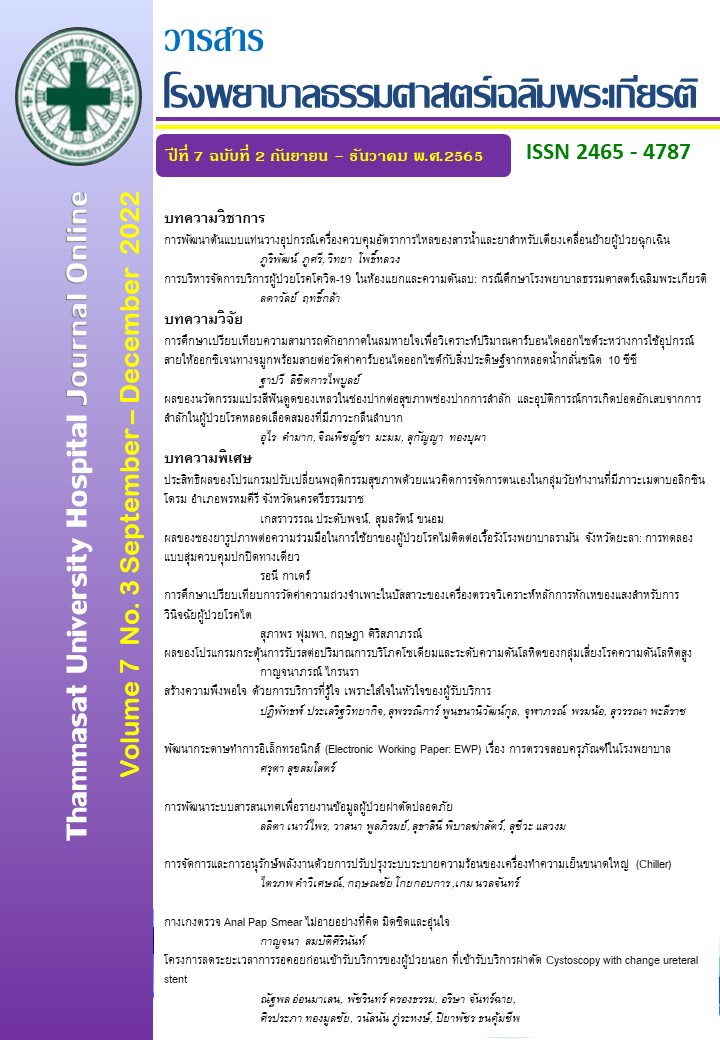The Effect of Taste Stimulation Program for Sodium Intake among High Risk of Hypertensive
Keywords:
Taste Stimulation Program, High Risk of Hypertensive, Low saltAbstract
Background: Hypertension causes various complications resulting in disability and death. The best prevention is to encourage people to have appropriate health behaviors, where reducing sodium intake is an important factor that helps prevent new cases of hypertension.
Objective: To study the effect of a taste stimulation program on sodium intake and blood pressure levels in hypertensive risk groups at Thung Yai District, Nakhon Si Thammarat Province.
Material and methods: This Quasi-experimental research the experimental group received a 12 weeks taste stimulation program. The 1st week, we collected general information on how to cook and perception of salinity. The 2nd week, sodium intake was assessed as well as blood pressure measuring, educate/ practice cooking skills, reduce salt and taste stimulation. The 3rd week, self-management according to the manual for taste stimulation was performed. At the 11th-12th week, post-experimental data were collected. The control group was maintained according to the usual guidelines by providing health education and documents on risk reduction practices.
Result: Results after 12 weeks of trial, the experimental group had mean sodium intake decreased from 2,984.38 (SD=515.63) to 1,718.75 (SD=309.46) mg./day. Mean systolic blood pressure decreased from 130.87 (SD=15.46) is 118.69 (SD=14.29) mmHg. And mean diastolic blood pressure decreased from 85.00 (SD=10.87) to 78.06 (SD=10.37) mmHg. which is statistically significant (p<.05).
Conclusion: The research results were used as a guideline for people at high risk of hypertension to reduce their sodium intake which is resulted in a reduction of new cases of hypertension.
References
World Health Organization.Noncommunicable diseases country profiles 2018.
กองโรคไม่ติดต่อ กรมควบคุมโรค สำนักโรคไม่ติดต่อ กระทรวงสาธารณสุข. ข้อมูลโรคไม่ติดต่อ เรียกใช้เมื่อ 11 มีนาคม 2563 จากhttp://thaincd.com/2016/
mission/documentsdetail.php?id=13684&tid=32&gid=1-020.
Onsrinoi, N., Leelukkanaveera, Y., & Toonsiri, C. Predictive factors of hypertension preventive behaviors among people with per-hypertension. Songklanagarind Journal of Nursing, 2017;37:63-74.
รวีวรรณ สุรเศรณีวงศ์. สุขภาพช่องปากในผู้สูงอายุ. วารสารโรงพยาบาลเจริญกรุงประชารักษ์, 2018;14:87-100.
Madiloggovit, J., Chotechuang, N., & Trachootham, D. Impact of self-tongue brushing on taste Perception Perception in Thai older adults: A pilot study. Geriatric Nursing, 2016;37:128-136.
Polit, D. F. Hungler. BP. Nursing research: Principles and methods (3rd ed.). Philadelphia, PA: Lippincott. 1987.
สมาคมความดันโลหิตสูงแห่งประเทศไทย. แนวทางการรักษาโรคความดันโลหิตสูงในเวชปฏิบัติทั่วไป พ.ศ. 2562. (พิมพ์ครั้งที่ 1). 2562; เชียงใหม่: สํานักพิมพ์ทริคธิงค์.
พิเชษฐ์ หอสูติสิมา. ผลของโปรแกรมสุขศึกษาในการป้องกันโรคความดันโลหิตสูง กลุ่มเสี่ยงตำบลจระเข้หิน อำเภอครบุรี จังหวัดนครราชสีมา พ.ศ. 2560. The office of disease prevention and control 9th Nakhon Ratchasima Journal,2560;25: 56-66.
Khan, A. M., Ali, S., Jameela, R. V., Muhamood, M., & Haqh, M. F. (2019). Impact of fungiform papillae count on taste perception and different methods of taste assessment and their clinical applications: a comprehensive review. Sultan Qaboos University Medical Journal, 2019;19: e184.
Kanfer, F. H., & Gaelick-Buys, L. Self-management methods. In F. H. Kanfer & A. P. Goldstein (Eds.), Helping people change: A textbook of methods: Pergamon Press; 1991. pp. 305–360.
ชุษณา เมฆโหรา. โซเดียม การรับรสเค็มและการปรับลดปริมาณโซเดียมในผลิตภัณฑ์อาหาร. อาหาร. JFRPD. 2565; 52(1): 16-23.
Bandura, Albert. Fearful expectations and avoidant actions as coeffects of perceived self-inefficacy. 1986: 1389.
Provenzano F, Stark S, Steenkiste A, et al. Dietary Sodium Intake in Type 2 Diabetes. Clin Diabetes, 2014; 32(3), 106-112.
Vegter S, Perna A, Postma J, et al. Sodium intake, ACE inhibition, and progression to ESRD. J AM SOC NEPHROL, 2012; 23, 165-173.
Yu W, Luying S, Haiyan W, et al. Importance and benefits of dietary sodium restriction in the management of chronic kidney disease patients: Experience from a single Chinese center. INT UROL NEPHROL. 2012; 44(2), 549-556.
Trachootham, Dunyaporn, et al. Differences in taste perception and spicy preference: a Thai–Japanese cross-cultural study. Chemical senses 43.1; 2018: 65-74.
Sartori, Amanda Caroline, et al. educational intervention using WhatsApp on medication adherence in hypertension and diabetes patients: a randomized clinical trial. Telemedicine and e-Health, 2020, 26(12): 1526-1532.
Downloads
Published
How to Cite
Issue
Section
License
Copyright (c) 2022 Thammasat University Hospital Journal Online

This work is licensed under a Creative Commons Attribution-NonCommercial-NoDerivatives 4.0 International License.



